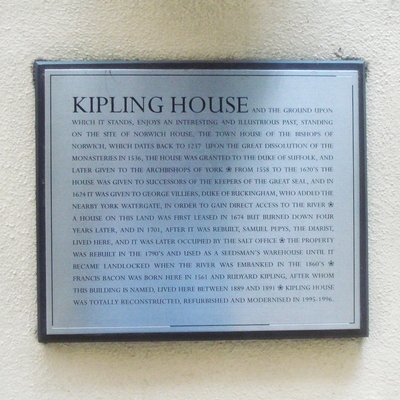British History Online explains "The salt tax, which was unknown in England until 1694, was enforced during the greater part of the eighteenth century. The tax was repealed in 1730, but was reimposed at the suggestion of Sir Robert Walpole in 1732." That page is all about Buckingham Street and refers to The Salt Office being, variously, at numbers 12, 14, 19, over the years 1706-88. This is after York House has been demolished and redeveloped into a number of streets including Buckingham Street.
This section lists the memorials where the subject on this page is commemorated:
Salt Office
Commemorated ati
Kipling House
The wording on the plaque could have been clearer. The first half is giving t...
Other Subjects
Vintners' Company
One of the Twelve Great Livery Companies of the City of London. Its origins steeped in the history of the City of London, and the import, regulation and sale of wine.
Frost Fairs
There are records of the Thames freezing over as far back as CE 250. The piers of old London Bridge were broad and close together, meaning that they could get easily blocked creating a dam which wo...
Windsor Castle pub
Restored in 1990. Described by Time Out as "this absurd pub, apparently popular with every minor celebrity you can think of". August 2016: Londonist informs that the pub is about to close and has ...
O'Neill's
Chain of Irish themed public houses. The first was opened in Aberdeeen and there are currently (2013) forty-nine outlets.
Dorsett Hospitality International
From their website: "Dorsett City is the perfect choice for business and leisure travellers seeking a 4-star hotel where British Charm meets Asian Hospitality" etc.
Previously viewed
Thomas Wyon
Engraver and medallist. Born Birmingham, his father Thomas also being an engraver as were a number of other (male, obviously) members of his family such as Edward Wyon, his brother. Chief engrave...
W. J. Baker
Co-partner or employee of the South Suburban Gas Company. Served but did not die in WW1.
J. W. Rollings
Member of the staff of A. W. Gamage Ltd and/or Benetfink & Co. Ltd. Killed in WW1.








Comments are provided by Facebook, please ensure you are signed in here to see them